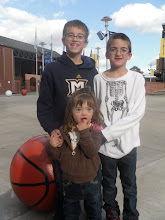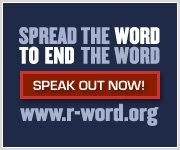Last night in class we talked about microaggressions. These are brief, everyday exchanges that send a denigrating message to a target group. They can be against any minority group such as one related to race, gender, religion, and/or sexual orientation - but I am going to relate microaggressions to the area of disability given that is my focus of this blog. So in terms of my discussion, these would be exchanges that give a denigrating message against people with a disability. You think these ever happen? You bet.
Sue and Sue (2008) indicate that microaggressions are often subtle in nature and can be manifested in verbal, nonverbal, visual, or behavioral ways. Most often they are automatic and unconscious (like use of the r-word with some individuals when the word just slips out and they are unaware of their use of it), but microaggressions can also be delivered intentionally (like with some purposeful message of hate meant to directly hurt those with a disability or their families).
There are three basic types of microaggressions. A microassault is a blatant verbal, nonverbal, or environmental attack intended to convey discriminatory and biased sentiment. There are three ways this can manifest. First, the use of a microassault could be overt when some anonymity can be ensured (I think this often seen on the internet in how some individuals talk about those with a disability). Secondly, it can be used when in presence of others who the messenger thinks will tolerate the microassault. I liken this area to Ben Stiller's movie Tropic Thunder. He probably saw the characterization of Simple Jack as something people would tolerate, and he was probably quite surprised by the strong reaction from advocacy groups. Lastly, a microassult can occur when people lose control of feelings and actions - maybe out of anger or because of the use of some substance, they lash out.
The second type of microaggression are microinsults. These are unintentional behaviors or verbal comments that convey rudeness or insensitivity or demean a person’s identity. They are characterized by some insulting hidden message. Use of the r-word and using it to describe someone or something would be an example. Until tonight I never realized that Charlie and the Chocolate Factory has the r-word in it. Riley approached me earlier to tell me the guy who gets teeny-tiny and goes inside the TV says the r-word at one point about something being so easy...you get the point. That would be a microinsult.
Lastly, Sue and Sue describe a microinvalidation as verbal comments or behaviors that exclude, negate, or dismiss the psychological thoughts, feelings, or experiential reality of the target group. Again this is usually unintentional and outside awareness of the aggressor. It would be things like "oh it will be ok" or just not acknowledging the mother of a child with Down syndrome in the cry room (not that that ever happened to me or anything - LOL).
What are the problems these microaggressions cause for the target? They can feel negated and dismissed. It hurts them. However, if it is something that was only given in a verbal exchange, they may not have evidence, only a felt experience. They may begin to doubt themselves and what happened. And this microaggression can be explained away and disregarded by alternative explanations. So they are left wondering. Also others may discount the significance of the distress caused, but over time it can negatively impact well-being. Lastly, it puts the target in a difficult situation. They experience risk if confronting the aggressor, but also experience risks if they don’t confront. Ultimately for myself, I decide to risk confronting because all see in my mind is Quinn's face and feel the need to do something.
-Karyn
What day is it, even?
5 years ago


















What this reminds me of is the jellyfish friend in Bridgette Jones Diary. She has a 'friend' that skillfully stings her little by little with thinly disguised insults each time she sees her. Also, in my circle, we call people in our lives who act this way 'crazymakers' or 'underminers.' There is a series of comedy shorts with the main character as an underminer that are hilarious. Here's one: http://www.youtube.com/watch?v=p8TY4LSdjLI&feature=player_embedded
ReplyDeleteThese examples are of people who insult in a broad or general sense and not at a target pop, but you get my idea.
---Jen